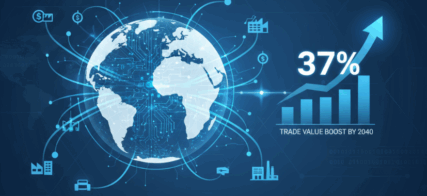
AI in Global Trade: WTO Sees Major Shift Ahead
Artificial intelligence is set to transform global trade, according to the World Trade Organization’s latest report. The study predicts AI could boost the value of goods and services traded worldwide by up to 37% by 2040.
Trade Boost from Lower Costs and Higher Productivity
The WTO’s World Trade Report 2025 says artifical intelligence will cut costs in logistics, compliance, and communication. These savings, combined with productivity gains, could help global trade expand significantly. The report estimates global GDP could grow by 12–13% under different AI adoption scenarios.
AI as a Bright Spot in Global Trade
WTO Deputy Director General Johanna Hill called AI a “bright spot” in a turbulent trading landscape. She noted that AI is already reshaping the global economy and will play a key role in reducing barriers to trade.
Opportunities for Small Businesses and Developing Nations
One of the biggest gains could come from AI-powered translation tools. These can make international communication faster and cheaper, enabling small producers and retailers to expand globally. According to the WTO, export growth in low-income nations could rise by up to 11% if they strengthen digital infrastructure.
Risk of Unequal Growth Without Inclusive Policies
While artifical intelligence offers clear opportunities, the report warns of risks. Without targeted investment, digital divides could worsen. Workers and economies lacking access to artficial intelligence could fall behind. To prevent this, the WTO stresses the need for predictable trade rules and lower tariffs on key materials like semiconductors that drive AI development.
AI’s Role in Future Trade Rules
The WTO highlights that global cooperation will be critical. Supportive policies, inclusive strategies, and fair access to technology will decide how evenly artificial intelligence’s benefits are shared across the world economy.
